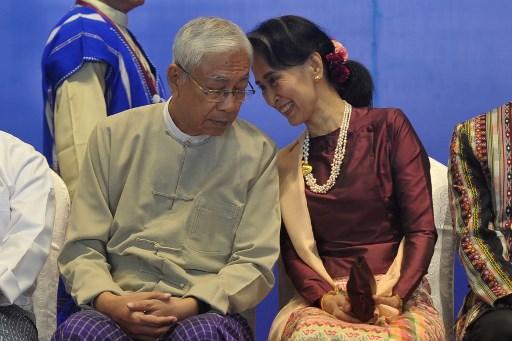
Myanmar’s president and Aung San Suu Kyi’s right-hand man Htin Kyaw stepped down from his position on March 21, 2018 after two years in the position, his office said.
/ AFP PHOTO / AUNG HTET
by Richard Sargent
Agence France Presse
YANGON, Myanmar (AFP) — Myanmar’s President Htin Kyaw resigned suddenly on Wednesday leaving the country’s de facto leader Aung San Suu Kyi without a close confidant and political ally as she faces rising international opprobrium over the Rakhine crisis.
The president, an old school friend of Suu Kyi, served as her proxy in an office she was barred from occupying under Myanmar’s military-drafted constitution.
His role was largely ceremonial with Suu Kyi calling the shots within her civilian administration, under the self-appointed title of State Counsellor.
But he was nonetheless the country’s head of state and a key domestic ally for Suu Kyi within her party.
Myanmar’s Vice President Myint Swe, a retired general close to the former junta leader Than Shwe, will temporarily move into the role until a new president is in place, according to the constitution.
Observers say this will likely make some inside Suu Kyi’s ruling National League for Democracy (NLD) party queasy as, in theory, decisions could be pushed through – or held back – in this time.
Speculation had swirled for months about the health of Htin Kyaw, 72, who had recently lost weight and has had heart problems in the past.
“Myanmar President U Htin Kyaw resigned on March 21, 2018,” a statement on the president’s official Facebook page said.
His office did not give many details for why he resigned Wednesday, only saying that “he wanted to take a rest from his current duty”.
It added that a new leader will be selected “within seven working days”.
Shortly after the announcement, Speaker of the Lower House and Suu Kyi ally Win Myint resigned from his position, narrowing his odds of taking up Myanmar’s top civilian office.
“Anyone she selects as president will be someone she has complete trust in,” said independent analyst Richard Horsey.
“That trust is the basis of her being the seat of power in Myanmar. She has no power under the constitution. Any power comes from that relationship with the president.”
– Loyal school friend –
Htin Kyaw, the country’s first civilian president since 1962, was widely respected and seen as unerringly devoted to Suu Kyi, who said she would rule “above” him after he was elected in 2016.
He has stood firmly by her side even as as her reputation has been shredded internationally for not speaking up on behalf of the persecuted Rohingya Muslim community.
A violent military crackdown has forced some 700,000 Rohingya to flee over the border into squalid camps in Bangladesh, in what the UN has branded “ethnic cleansing” with possible “hallmarks of genocide”.
The military justifies its campaign as a legitimate response to Rohingya militant attacks against police posts in August.
The civilian government is in a transitional power-sharing arrangement with the army which still retains huge political and economic power.
The army controls three key ministries — home affairs, borders and defence — effectively giving it a carte blanche to conduct any security operations it chooses.
It also has a quarter of legislative seats reserved for officers, giving the military a de facto veto over any constitutional change.
Defenders of Suu Kyi say her government’s hands are tied by the military but critics maintain it could and should have done more to speak up against alleged army atrocities, particularly in Rakhine State.
Domestically Suu Kyi still enjoys broad popular support but, two years into government, her party has disappointed sky-high expectations of rapid development and economic growth, while the Rakhine crisis has recast the international narrative of the country.
Htin Kyaw is the son of a revered poet and helped run Suu Kyi’s charitable foundation before taking over the presidency.
According to an official biography, he studied at the University of London’s Institute of Computer Science from 1971 to 1972.
In a varied career he worked as a university teacher and also held positions in the finance and national planning and foreign affairs ministries in the late 1970s and 80s before retiring from government service as the military tightened its grip.
© Agence France-Presse







